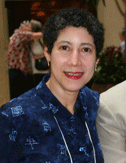Profile

Lillian Comas-Díaz
Training Location(s):
PhD, University of Massachusetts (1979)
MA, University of Puerto Rico (1973)
BA, University of Puerto Rico (1970)
Primary Affiliation(s):
Transcultural Mental Health Institute, Washington DC (1986-present)
George Washington University School of Medicine (1986-present)
Yale University Department of Psychiatry (1979-1984)
Psychology’s Feminist Voices Oral History Interview:
Career Focus:
Ethnocultural approaches to mental health; women's spirituality; intersecting identities; social justice; liberation psychology.
Biography
Although Dr. Lillian Comas-Díaz was born in Chicago, Illinois, she moved to her parents' native Puerto Rico when she was 6 and lived there until her early twenties. Comas-Díaz feels that these formative years spent in Puerto Rico were crucial to her identity as a "woman of intersections," since Puerto Rico itself is an intersection of different racial and ethnic groups and diverse ways of life. Comas- Díaz believes she was destined to be a psychologist due to her family's background and culture. Her great-grandmother and grandmothers were healers and her mother is a nurse, so she feels she naturally adopted the role of healer. Her first experience working as a psychologist came at a very young age: A major hurricane hit Puerto Rico right before she arrived there from Chicago, and as she was the only student in her school who had not experienced the storm, the students would come and talk to her about their distress.
Comas-Díaz identifies herself as a feminist of colour. As a feminist of colour, she highlights the contradictions, paradoxes, and multiple realities that characterize the lives of women of colour. She was exposed to many mixed messages growing up. Her father was disappointed that, being the first child, she was not male, but at the same time conveyed his great hope for her, telling her she could be "the President of the United States!" if she wanted to.
Comas-Díaz attended college right around the time of second wave feminism and while Puerto Rico was going through the independence movement. She was part of the movement along with her friends; however, she did feel a sense of alienation from her peers based on having been born in the United States, which others referred to as "the mainland." Puerto Ricans born on the island were suspicious of those born on the mainland. Thus, while Comas- Díaz read the second wave feminism literature, she read it secretly because if "you read in English, you were suspicious!"
During her graduate clinical psychology program, Comas-Díaz learned a systems approach to psychology. After receiving her Master's degree, she moved to Connecticut and delivered psychological services in schools, churches, and ghettos. She identified psychology's limitations in addressing the needs of underserved populations and became an advocate for them. She integrated her professional, personal, and political experiences to conceive a feminist liberation model. To further help underprivileged and minority groups, she enrolled in doctoral program in clinical psychology at the University of Massachusetts. During her internship period, she developed community, education, and media programs on cultural awareness, antiracism, empowerment, and prevention.
As a feminist of colour, Comas-Díaz's work brings to feminism the strategies of oppressed people. Since people of colour are in the margins, when they enter a discipline or group they bring cultural resilience, which brings resistance and not just adaptation. Comas- Díaz has been involved in American Psychological Association (APA) and the Committee on Women in Psychology (CWP). She started her involvement in different organizations after she came back to the United States from Puerto Rico. When she started working for APA in Washington DC in 1984, she saw that politics, organizations, and psychology go hand in hand. She learned the language and the rules necessary to live in these worlds. She also saw that all issues, such as gay and lesbian issues, public interest issues, and minority issues are all interrelated. Comas- Díaz played a critical role in creating Division 45 of the APA, the Society for the Psychological Study of Ethnic Minority Issues. She worked hard to gather support - and enough signatures - to start the Division. She became 45's first treasurer, and was the first editor-in-chief of its new journal, Cultural Diversity and Mental Health. To get this journal published under the auspices of the newly founded society, she played the role of a "broker" with the publishers of the journal and it is still running beautifully. This journal became a way for her to share the division's rich oral history and to write about culture and diversity issues. In 2019 Comas- Díaz was awarded the American Psychological Association Gold Medal Award for life achievement in the practice of psychology.
Comas-Díaz believes that the ethnocentricity of America is changing as new cultures are created and Americans are increasingly affected by international issues. Psychologists of colour are playing a leading role in this transition towards a more inclusive and less ethnocentric psychology, but it has not been an easy journey. As she puts it, "when there is birth, there is pain".
by Dilraj Pama (2010) updated (2019)
To cite this article, see Credits
Selected Works
Comas-Díaz, L. & Torres Rivera, E. (Eds.) (2020). Liberation psychology: Theory, method, practice, and social justice. Washington, DC: American Psychological Association.
Comas-Díaz, L. & Vazquez, C. I. (Eds). (2018). Latina psychologists: Thriving in the cultural borderlands. New York, N.Y: Routledge.
Comas-Díaz, L. & Greene, B. (Eds.) (2013). Psychological health of women of color: Intersections, challenges, and opportunities. Santa Barbara. CA: Praeger/Greenwood.
Comas-Díaz, L (2008). Spirita: Reclaiming womanist sacredness in feminism. Psychology of Women Quarterly, 32, 13-21.
Rayburn, C. & Comas-Díaz, L. (Eds.). (2008). WomanSoul: The inner life of women's spirituality. Westport, CT: Praeger.
Comas-Díaz, L. (2000). An ethnocultural approach to psychotherapy and to life. In J. J. Shaw & J. Wheelis (eds), Odysseys in psychotherapy (pp. 46-66). Arden Media.
Comas-Díaz, L., & Lykes, B., & Alarcon, R. (1998). Ethnic conflict and the psychology of liberation in Guatemala, Peru and Puerto Rico. American Psychologist, 53, 778-792.
Comas-Díaz, L. (Eds). (1994). Women of color: Integrating ethnic and gender identities in psychotherapy. New York: Guilford Press.
Comas-Díaz, L., & Greene, B. (Eds). (1988). Clinical guidelines in cross cultural mental health. New York: Wiley.
Comas-Díaz, L. (1987). Feminist therapy with Hispanic/Latina women: Myth or reality? Women and Therapy, 6(4), 39-61.
Comas-Díaz, L. (1981). Effects of cognitive and behavioural group treatment in the depressive symptomatology of Puerto Rican women. Journal Consulting and Clinical Psychology. 49, 627-632.
Photo Gallery



Lillian Comas-Díaz
Training Location(s):
PhD, University of Massachusetts (1979)
MA, University of Puerto Rico (1973)
BA, University of Puerto Rico (1970)
Primary Affiliation(s):
Transcultural Mental Health Institute, Washington DC (1986-present)
George Washington University School of Medicine (1986-present)
Yale University Department of Psychiatry (1979-1984)
Psychology’s Feminist Voices Oral History Interview:
Career Focus:
Ethnocultural approaches to mental health; women's spirituality; intersecting identities; social justice; liberation psychology.
Biography
Although Dr. Lillian Comas-Díaz was born in Chicago, Illinois, she moved to her parents' native Puerto Rico when she was 6 and lived there until her early twenties. Comas-Díaz feels that these formative years spent in Puerto Rico were crucial to her identity as a "woman of intersections," since Puerto Rico itself is an intersection of different racial and ethnic groups and diverse ways of life. Comas- Díaz believes she was destined to be a psychologist due to her family's background and culture. Her great-grandmother and grandmothers were healers and her mother is a nurse, so she feels she naturally adopted the role of healer. Her first experience working as a psychologist came at a very young age: A major hurricane hit Puerto Rico right before she arrived there from Chicago, and as she was the only student in her school who had not experienced the storm, the students would come and talk to her about their distress.
Comas-Díaz identifies herself as a feminist of colour. As a feminist of colour, she highlights the contradictions, paradoxes, and multiple realities that characterize the lives of women of colour. She was exposed to many mixed messages growing up. Her father was disappointed that, being the first child, she was not male, but at the same time conveyed his great hope for her, telling her she could be "the President of the United States!" if she wanted to.
Comas-Díaz attended college right around the time of second wave feminism and while Puerto Rico was going through the independence movement. She was part of the movement along with her friends; however, she did feel a sense of alienation from her peers based on having been born in the United States, which others referred to as "the mainland." Puerto Ricans born on the island were suspicious of those born on the mainland. Thus, while Comas- Díaz read the second wave feminism literature, she read it secretly because if "you read in English, you were suspicious!"
During her graduate clinical psychology program, Comas-Díaz learned a systems approach to psychology. After receiving her Master's degree, she moved to Connecticut and delivered psychological services in schools, churches, and ghettos. She identified psychology's limitations in addressing the needs of underserved populations and became an advocate for them. She integrated her professional, personal, and political experiences to conceive a feminist liberation model. To further help underprivileged and minority groups, she enrolled in doctoral program in clinical psychology at the University of Massachusetts. During her internship period, she developed community, education, and media programs on cultural awareness, antiracism, empowerment, and prevention.
As a feminist of colour, Comas-Díaz's work brings to feminism the strategies of oppressed people. Since people of colour are in the margins, when they enter a discipline or group they bring cultural resilience, which brings resistance and not just adaptation. Comas- Díaz has been involved in American Psychological Association (APA) and the Committee on Women in Psychology (CWP). She started her involvement in different organizations after she came back to the United States from Puerto Rico. When she started working for APA in Washington DC in 1984, she saw that politics, organizations, and psychology go hand in hand. She learned the language and the rules necessary to live in these worlds. She also saw that all issues, such as gay and lesbian issues, public interest issues, and minority issues are all interrelated. Comas- Díaz played a critical role in creating Division 45 of the APA, the Society for the Psychological Study of Ethnic Minority Issues. She worked hard to gather support - and enough signatures - to start the Division. She became 45's first treasurer, and was the first editor-in-chief of its new journal, Cultural Diversity and Mental Health. To get this journal published under the auspices of the newly founded society, she played the role of a "broker" with the publishers of the journal and it is still running beautifully. This journal became a way for her to share the division's rich oral history and to write about culture and diversity issues. In 2019 Comas- Díaz was awarded the American Psychological Association Gold Medal Award for life achievement in the practice of psychology.
Comas-Díaz believes that the ethnocentricity of America is changing as new cultures are created and Americans are increasingly affected by international issues. Psychologists of colour are playing a leading role in this transition towards a more inclusive and less ethnocentric psychology, but it has not been an easy journey. As she puts it, "when there is birth, there is pain".
by Dilraj Pama (2010) updated (2019)
To cite this article, see Credits
Selected Works
Comas-Díaz, L. & Torres Rivera, E. (Eds.) (2020). Liberation psychology: Theory, method, practice, and social justice. Washington, DC: American Psychological Association.
Comas-Díaz, L. & Vazquez, C. I. (Eds). (2018). Latina psychologists: Thriving in the cultural borderlands. New York, N.Y: Routledge.
Comas-Díaz, L. & Greene, B. (Eds.) (2013). Psychological health of women of color: Intersections, challenges, and opportunities. Santa Barbara. CA: Praeger/Greenwood.
Comas-Díaz, L (2008). Spirita: Reclaiming womanist sacredness in feminism. Psychology of Women Quarterly, 32, 13-21.
Rayburn, C. & Comas-Díaz, L. (Eds.). (2008). WomanSoul: The inner life of women's spirituality. Westport, CT: Praeger.
Comas-Díaz, L. (2000). An ethnocultural approach to psychotherapy and to life. In J. J. Shaw & J. Wheelis (eds), Odysseys in psychotherapy (pp. 46-66). Arden Media.
Comas-Díaz, L., & Lykes, B., & Alarcon, R. (1998). Ethnic conflict and the psychology of liberation in Guatemala, Peru and Puerto Rico. American Psychologist, 53, 778-792.
Comas-Díaz, L. (Eds). (1994). Women of color: Integrating ethnic and gender identities in psychotherapy. New York: Guilford Press.
Comas-Díaz, L., & Greene, B. (Eds). (1988). Clinical guidelines in cross cultural mental health. New York: Wiley.
Comas-Díaz, L. (1987). Feminist therapy with Hispanic/Latina women: Myth or reality? Women and Therapy, 6(4), 39-61.
Comas-Díaz, L. (1981). Effects of cognitive and behavioural group treatment in the depressive symptomatology of Puerto Rican women. Journal Consulting and Clinical Psychology. 49, 627-632.


